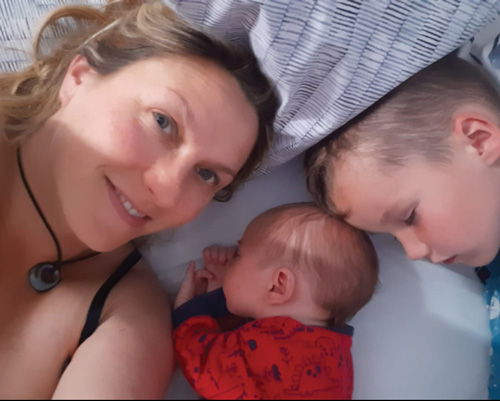
When it comes to parenthood, I believe we are hard wired like all mammals to fiercely protect, nourish and raise the next generation. Our attention to this biological task makes us particularly susceptible to the perceived wisdom as to how best to do this. Having had a keen interest in baby and childcare and early years education over the last 40 plus years, one thing I have observed is that every childbirth and baby guru of their time is deposed by the new emergent one. Former ‘truths’ on how to best prepare for labour, ensure good feeding/sleep habits/social skills and so on get rubbished as the pendulum swings from left to right. What is the ‘must do’ one decade is ‘avoid at all costs’ the next, with dire warnings of what will befall your impressionable infant in later life if you ignore the latest theory on bringing up baby.
A small example of changing trends is how baby should sleep. In the l950s babies were placed on alternate sides. This was thought to prevent choking, avoid a flat head and to flatten ears. In the l960s-1980s the advice was to place baby on its front to avoid choking, ease tummy aches and strengthen baby’s neck. Concern over cot deaths (more to do probably with smoky rooms, low breastfeeding rates and overheating than position) the advice again changed and from the l990s onward the advice is to place baby on its back with very light cover.
Lets look at the influencers. The first baby and childcare guru was Truby King, a childcare and health reformer from New Zealand. His premise was that a rigid routine of feeding, toilet training, sleeping, exposure to fresh air and limited physical contact led to good health and a robust character in later life. In his 1937 book ‘Feeding and Care of Baby’, Truby King warns “Fond and foolish over-indulgence, mismanagement, and ‘spoiling’ may be as harmful to an infant as callous neglect or intentional cruelty.” Are you appalled? Well, his doctrine spread across the Western world in the first half of the 20th century, and his theories of necessary strict routine, potty training, lots of fresh air, crying being good for the lungs and so on were still popular in the 1950s. The notion he introduced of ‘spoiling baby’ is now refuted, but this would have been the method by which our national treasures were raised (including our late Queen), and your own grandparents! How did they turn out?
So it was with relief that 1960s parents embraced the kindlier advice of Dr Benjamin Spock, an American paediatrician whose book ‘Baby and Child Care’ was one of the best selling books of the 20th century. His first chapter is entitled ‘Trust Yourself – You know more than you think you do’, followed by the reassurance “Don’t take too seriously all that the neighbours say. Don’t be overawed by what the experts say. Don’t be afraid to trust your own common sense“. Great advice, I think, that doesn’t date.
Dr Spock’s theories were followed by Dr Penelope Leach, an English psychologist and baby guru. She started the fashion of baby centred parenting. If you are a young parent or parent-to-be reading this, your own early years are likely to have been heavily influenced by the wisdom of both Dr Spock and Dr Leach. In the last twenty years the ‘Continuum Concept’ theory has been popular leading to many ‘Attachment Focused’ baby and child care publications.
But, guess what? About 15 years ago Gina Ford (neither a mother, nor a paediatrician but a nanny) revisited the concept of establishing strict routines. Her ‘Contented Little Baby Book’ became a best seller and made her the first baby care guru of the 21st century. Along similar lines, Ferber Sleep Training and the ‘Cry it Out’ method is also currently popular with exhausted parents.
And so the pendulum of advice continues to swing back and forth. However, I have never known quite such polarisation of advice competing for validation at the same time. I follow several online support groups for new parents, most following a particular baby care approach. I am concerned that many mums are exhausted to the point of hallucination by feeling they need to observe the doctrine of having their babies and toddlers physically attached to them at all times, and letting baby take the lead on everything, including toddler night feedings. Don’t misunderstand me, if you just love co-sleeping, contact napping, baby wearing or toddler demand feeding, that’s great and you will treasure this special time and confidently bat away those who tell you that you are establishing bad habits or “spoiling” baby. But if baby wearing is not for you, that’s all right too.
It’s also OK to reject the ‘must do’ baby sleep training if it doesn’t gel with your personality or is counter intuitive. Really, experience and observation has convinced me that there’s no one right way of bringing up baby. I suggest you do your own research – ask what is working for your friends and ask what advice worked for your family. Maybe look at your mum’s old copy of Penelope Leach. I’ve had four children spread over 12 years. Each brought their individual personality and sensitivities into the world. What suited one baby certainly didn’t the next, and my baby care needed to adapt to that (although I too was influenced by the latest trend).
Make sure your antenatal course covers the fourth trimester and early parenthood, and that your teacher spends time looking at the different approaches to baby care, so you can consider what feels right for you, your lifestyle and your particular baby. And to quote Dr Spock: “Trust your instincts”.











